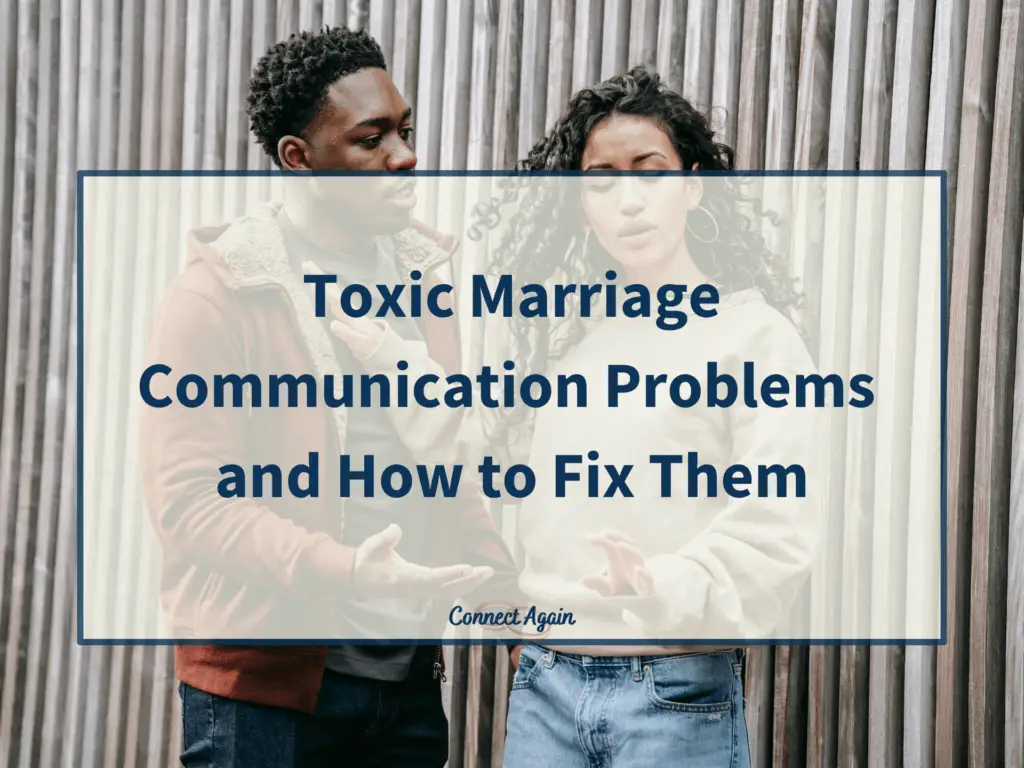Do you struggle to talk to your spouse? Can’t get your spouse to open up to you? Marriage communication problems can be a strain on the relationship. Learn how to identify and resolve these problems with practical tips and advice in this comprehensive guide.

- What is marriage communication?
- Communication in marriage is important
- Marriage communication problems: Why is communication so hard in marriage?
- What are bad communication habits in marriage?
- Signs of poor communication in marriage
- Does lack of communication lead to divorce? How marriage communication problems affect your marriage
- What causes a lack of communication in marriage?
- How to fix marriage communication problems
- A note on non-verbal communication and your marriage
- Technology’s impact on communication
- When to get help: communication marriage counseling
- Marriage Communication Problems
What is marriage communication?
Marriage communication is everything you talk about with your spouse. Spouses should be able to share everything with each other.
The communication you have with your spouse is unique. You won’t have the same kind of communication with anyone else. It goes deeper than regular conversations.
Communication in marriage is important
If there’s no communication in your marriage, you will likely struggle. Communication is a way to share emotional intimacy together. It’s how you share your fears, hopes, dreams, etc. Share your wins and losses with your spouse. You chose this person to be with you through it all … so why wouldn’t you tell them about it?
Can marriage survive without communication?
Marriage cannot survive without communication. Even if you talk to your spouse every day, are you truly communicating with them?
For example, do you just talk about work and the kids? This is an example of poor communication in marriage. A marriage that solely relies on this type of communication cannot survive.
You married your spouse to share your life with them. Communication is a big part of that.
Marriage communication problems: Why is communication so hard in marriage?
Communication can become so difficult in marriage for many reasons. Things build up, feelings get hurt, and issues go unresolved. Over time, it can become harder and harder to communicate with your spouse. The longer you let issues fester, the bigger they become.

What are bad communication habits in marriage?
Here are some bad communication habits in your marriage. You may not have realized you were even doing some of these! When communication breaks down in marriage, you might find yourself:
- Not listening when your spouse talks to you
- Only thinking about how you feel about a situation
- Always taking an argumentative tone
- Not having deep conversations with your spouse
- Getting defensive
- Placing blame
It’s time to take a good look at your communication skills with your spouse. Are you doing any of these bad habits? I’ll talk more below about how to turn these around and start making changes today.
Signs of poor communication in marriage
Here are a few signs to look out for:
- You don’t talk much: This is the first tell-tale sign that there are some marriage communication problems. Spouses should feel comfortable talking to each other.
- You only talk about work and the kids: How deep do your conversations go? Only talking about work and the kids could mean one of two things: (1) you don’t WANT to talk about deeper topics or (2) you’re just too busy and only focus on the to-do lists in your life. I’ll address each one below to help you come up with some attainable solutions.
- When there’s a problem, you don’t turn to each other: Your spouse should be your confidant. Are you afraid to go to your spouse because they haven’t reacted well to your feelings in the past?
- When you do try to talk about something important, your spouse doesn’t listen: Listening is a BIG part of communication.
- One (or both of you) make a situation about yourselves: When your spouse tries to talk to you about a problem, do you keep the conversation about them and their problem(s)? Or do you eventually end up turning it around to make it about yourself?
- You do not actively listen to your spouse: When your spouse is talking, does your mind wander?
- Your arguments tend to turn into rough fights: Every couple argues and disagrees. But do your arguments usually escalate into bigger problems?
Related post: How to Stop Saying “I Hate Parenting with my Husband”

Does lack of communication lead to divorce? How marriage communication problems affect your marriage
A lack of communication can definitely be a precursor to divorce. In fact, PsychCentral states that communication problems are a leading cause of divorce.
It makes sense. If you can’t talk to each other, how are you going to make your marriage work? Talking to your spouse should be something you look forward to, not dread.
A lack of communication can also exacerbate other issues in the marriage. When you can’t communicate, you can’t truly trust each other.
What causes a lack of communication in marriage?
A lack of communication in marriage can stem from a lot of different areas:
- Reacting poorly to each other in the past
- Holding on to grudges
- Not arguing constructively
- Issues from your past
How to fix marriage communication problems
Here’s how to fix communication breakdown in a relationship:
Practice active listening
When your spouse speaks, do you truly listen? VeryWellMind says that active listening goes “beyond simply hearing the words that another person speaks but also seeking to understand the meaning and intent behind them.” Here are some ways to actively listen:
- Don’t think about something else when your spouse is speaking
- Look your spouse in the eyes
- Ask follow up questions
- Clarify any points you don’t understand
- Reiterate what your spouse just said to make sure you didn’t miss anything
- Don’t judge

Work on your own emotional intimacy
Are you having trouble communicating because your marriage lacks emotional intimacy? This can have a big impact on communication in your marriage.
When you have strong emotional intimacy in your marriage, you are able to share anything with your partner. You can come to your spouse with your fears, hopes, worries, wins, etc. And you always know that you will be heard and listened to.
If you need help, here are 19 practical ways to build emotional intimacy in your marriage.
Don’t be afraid to be vulnerable
If you can’t be vulnerable with your spouse, how can you expect them to be? Sometimes it’s hard to be vulnerable because you don’t want to admit things to yourself. If you don’t like to focus on your weaknesses, it can be hard to be vulnerable with others.
Start by being vulnerable with yourself. “Talk” to yourself. Tell yourself what’s going on. How are you feeling? Why are you angry/sad/upset?
The more comfortable you become in being vulnerable with yourself, the easier it’ll be to open up to your spouse.
There have been times when I was upset about something and I didn’t communicate it well to Josh. I took a step back and thought about it. I allowed myself to be vulnerable. It helped me realize the deeper feelings that were behind the issue.
This then helps me communicate to Josh in a more calm manner. We both grow and learn from the issue (and about each other!).
Related post: To the Husbands Who Travel for Work: How to Connect with Your Wives
Talk about more than just work and the kids
Good communication in your marriage is about more than discussing your to-do lists. Talk about deeper topics, your opinions, your memories, etc.
If you need help finding conversation topics, see this post on our favorite conversation starters! We’ve personally used each one and love them! They’ve helped us connect, even with the kids around.
It’s important for your kids to see you communicating too. Let them see that you prioritize your marriage. You’ll be modeling a healthy marriage for them.
If you find yourself too busy to talk about other things, make a plan. Schedule some time to talk to each other. Create rules so you don’t go back to your old ways. There are so many things you can do to incorporate healthy conversation in your marriage!

Focus on your spouse
What are your spouse’s interests? Opinions? Dreams? What more can you learn about them?
The more you show an interest in your spouse, the more they’ll want to open up to you in the future. You are showing them that you care.
Recognize the part you play
Do you have poor communication habits with your spouse? It can be easy to spot your loved one’s faults so let’s take a step back and focus on you. How can you improve?
An easy way to analyze your communication skills is to flat out ask your spouse. How do they feel about your communication? Do they feel truly heard when they talk to you? Does that change if the conversation is difficult? Remember that good communication habits are practiced in every conversation.
Pick an area to work on
Did you figure out a couple of things you need to work on? Do you have a lot of things to work on? Start small and choose just one. Here are some ways to stick to your goal:
- Write down your communication goal on a post-it
- Tell your spouse about your goal
- Ask your spouse to keep you accountable
It can be difficult to point out when one of you strays from your goal. Let’s say your communication goal is to not get defensive. If you start to get defensive during a conversation, your spouse might be weary to point it out (maybe you’ve reacted badly to this in the past?).
One easy trick is to come up with a silly word that can be randomly said in a situation like this. Making the word silly will help defuse the tension a bit! You can use any word (tuplip, eyelid, falcon, etc.). Get creative and have fun coming up with a word together!
This method is also nice because you’ll begin to see that your partner truly has your back.

Recognize and resolve misunderstandings
We all come with our own preconceived notions about things. Did your spouse say something that hurt you? Is there a chance they didn’t mean to be hurtful? You’ll never know unless you talk it out!
I can’t tell you how many times Josh and I have discovered that our argument all stemmed from a misunderstanding: I said something intending it to mean one thing and Josh took it another way … I got frustrated because he was frustrated with me … so we began to argue.
But once we sat down and explained our points of view, we realized it was all just a big misunderstanding!
Related post: How to Appreciate Your Husband: 8 Simple and Effective Ways
Find a way to have difficult discussions
What if your arguments are bigger than misunderstandings? Do your arguments tend to get out of hand?
When you are both calm and happy, sit down and plan how you will communicate when a difficult conversation arises. Here are some “pledges” to make to each other (feel free to come up with your own or pick and choose from the ones below):
- We will remember that we love each other
- We will hit “pause” on the conversation if one of us is getting too upset or out of line
- We will actively listen to each other’s side
Check in with each other
Once you are both on the same page about improving your communication, make it a point to check in with each other on a regular basis. Here are some things you can discuss:
- “Has my communication improved?”
- “In what ways do I still need to work on my communication?”
- Tell your spouse how they are doing (improvements or wins)
- Celebrate any wins (Did you handle a tough conversation particularly well? Then give yourselves credit for it!)
Remember that you love each other and see the good
In the end, choose to see the good in your spouse. Remember that you love each other. If you approach every conversation with love, you will be just fine!

What to do if your husband is a poor communicator
If your husband is a poor communicator, try some of these ideas:
Get to the root of the issue
Why is your husband a poor communicator? Have your responded poorly in the past? Did he grow up in a household that didn’t communicate well?
The first step to getting your husband to open up is to figure out why. That will help you approach the situation with love and with a plan.
If your husband has sensitive issues from his past, you’ll need to approach this carefully. Remember that you love your husband and you want him to feel comfortable opening up to you.
Ask open ended, non intrusive questions
It can be very difficult to get someone to open up when they are naturally closed off. You don’t want to scare your husband away. If you push too hard, you might make him even more closed off.
Asking open ended questions is a great way to get your closed-off husband to feel more comfortable. He can respond in whatever manner he feels comfortable with.
Try asking follow up questions but stop if he’s beginning to close up again. Your main goal is to make him feel more comfortable.
Talk to your husband about his interests
Most people love talking about the things they are interested in. Your husband is no exception. If he likes baseball, learn a little about his favorite team. Watch a game with him.
Try participating in an activity together that makes your husband happy. He might be more willing to open up if he’s enjoying himself. As a bonus, you’ll make him feel like his interests and happiness matter to you.
Be frank with your husband
If your husband has trouble opening up, be honest. Tell him how it affects you. If you are not honest with him, how can you expect him to be honest with you?
Approach him with love about the situation. Tell him how it makes you feel. You can’t assume he knows that his lack of communication is hurting you.

Be patient
Change is not going to happen overnight. Your husband needs time to change and adjust. As long as you see that he is trying, take this as a small win.
People don’t change quickly. Lasting changes happen slowly over time. Remind yourself of that.
Empathize with your husband
Try to see things from his perspective. Does he have trouble communicating with you because of issues in his past? Does he have a hard time being vulnerable?
Remember that you love him and be there for him. Don’t see his lack of communication as a deficit. Instead, see the potential for growth.
A note on non-verbal communication and your marriage
Pay attention to what non-verbal cues you are sending to your spouse. Here are some examples of non-verbal communication:
- Facial expressions
- Body language
- Hand gestures
- Tone of voice
- Eye gaze
The way you communicate non-verbally is just as important as what you are actually saying. Watch how your body moves and reacts when you and your spouse are talking. Make sure you are sending loving non-verbal cues, especially during a difficult conversation.
Non-verbal communication is a simple area to work on. But you need to be very cognizant of your body. You may not realize that you are sending bad non-verbal cues to your spouse.
Pick 1 cue and notice what you do throughout the day. That will help you start down a path to better communication with your spouse.

Technology’s impact on communication
With so many ways to communicate, it’s ironic how little time we actually spend talking to one another. Don’t let technology get in the way of communicating with your spouse.
We are all busy and our technology helps keep us that way. Don’t let that become more important than your spouse.
When your spouse is talking, put your phone down. Look them in their eyes. Pay attention to what they are saying. How would you feel if you tried talking to your spouse about something important and they just stared at their phone?
Josh and I occasionally do “no phone” days. This was definitely easier before kids but it’s still doable! Designate a day (probably during the weekend) to completely put all technology away, including your phones. If you want to go the extra mile, don’t even turn the tv on! You’ll be amazed at how much more you focus on and pay attention to each other.
When to get help: communication marriage counseling
Have you tried all of the steps mentioned above? Do you feel like you’re spinning your wheels? There is no shame in getting help from a couples counselor.
Therapists are trained to help you overcome issues such as marriage communication problems. You can talk to someone about your specific issues. You’ll get advice that is tailored to your unique marriage.
There is no shame in reaching out for help.
It’s important to note that individual therapy can also be beneficial. If your spouse is apprehensive about going to a couples counselor, you can still see one. You will be able to learn a lot of valuable communication skills that can help your marriage.
Marriage Communication Problems
Communication in marriage is so important. If you are struggling to communicate with your spouse, remember to take a deep breath. You can always make changes and work on things one at a time.
Be open with your spouse about how you are feeling about your communication. Your spouse loves you and wants you to be happy. If you feel that there are significant problems in your communication, you need to speak up.



Such great info! Marriage is hard sometimes, but worth the effort!
I completely agree! It’s definitely worth the effort. Thank you for reading! 🙂
Such a great post! Communication is so important. I really appreciate the part about being frank. This is so true. Tap dancing just leads to confusion.
I’m so glad you liked the post 🙂 Thanks for reading! I completely agree: cut down the confusion and just be up front! It saves a lot of time in the end.
I Iove how informative this is! We’ve worked on our communication so much over the years that we believe it is key to a great marriage.
I’m so glad you found this to be informative! I love hearing from other couples how important they place communication in their marriage. Thanks for reading!
“When there’s a problem, you don’t turn to each other: Your spouse should be your confidant. Are you afraid to go to your spouse because they haven’t reacted well to your feelings in the past?”
I fully agree with this point. I also believe this is one way emotional affairs start.
Loved your tips like watching tone, pausing conversations when either becomes emotionally aroused, and even reaching out for marriage counseling.
Thank you so much! You make a really good point about emotional affairs. If your spouse isn’t there for you emotionally, you might turn to someone else for that comfort. Thank you for reading and I’m so glad you found it to be helpful!
I’ve learned that I MUST be the example of how I want to be treated when it comes to communicating with my husband. I have to show him how I wanted to be treated by the way I treat him.
Exactly!!! It’s so simple but can take some time to fully learn. And we falter all the time. But the fact that you recognize what works for you is great. You know that your communication will improve if you treat your husband the way you want to be treated. That’s awesome!
Guilty guilty guilty! My husband and I are both guilty of some of the things you have mentioned. We are aware of it now though and working on it. I love that you mentioned the non-verbal issues as well. That’s huge.
Oh, I’m so guilty of some of these too! It was honestly hard to write this post because I kept feeling bad about all the times I’ve done some of these things. But what you said is so important: you need to be aware of it. Then you can begin to make changes and grow. We always have room for improvement!
These are all very helpful suggestions. As a therapist myself, I sometimes struggle with listening to my husband when I feel stressed or frustrated. Learning to self-regulate, take breaks and re-center myself have helped tremendously.
Thank you so much for your input! It’s always helpful to hear that even therapists can struggle with communication! I’m glad you’ve found strategies that help you. That’s really what it’s all about in the end: finding what works for you.
Great post!
Thank you so much! And thank you for reading!